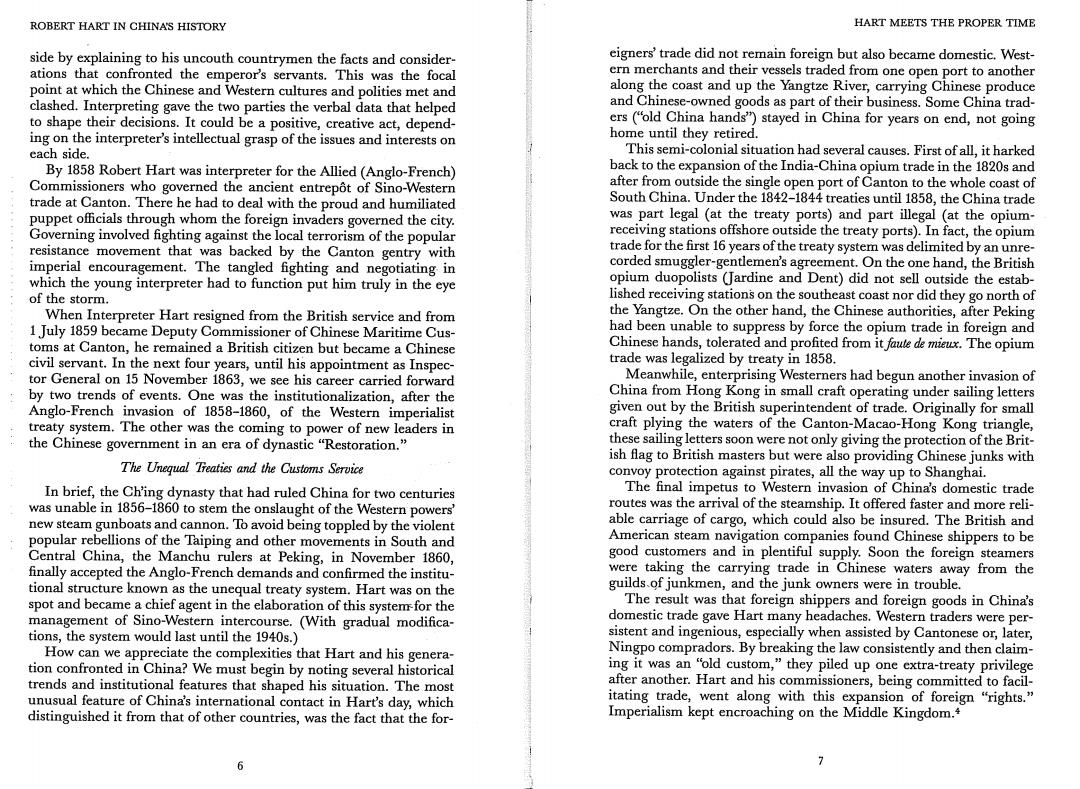正在加载图片...

ROBERT HART IN CHINAS HISTORY HART MEETS THE PROPER TIME side by explaining to his uncouth countrymen the facts and consider- eigners'trade did not remain foreign but also became domestic.West- ations that confronted the emperor's servants.This was the focal ern merchants and their vessels traded from one open port to another point at which the Chinese and Western cultures and polities met and along the coast and up the Yangtze River,carrying Chinese produce clashed.Interpreting gave the two parties the verbal data that helped and Chinese-owned goods as part of their business.Some China trad- to shape their decisions.It could be a positive,creative act,depend- ers("old China hands")stayed in China for years on end,not going ing on the interpreter's intellectual grasp of the issues and interests on home until they retired. each side This semi-colonial situation had several causes.First of all,it harked By 1858 Robert Hart was interpreter for the Allied(Anglo-French) back to the expansion of the India-China opium trade in the 1820s and Commissioners who governed the ancient entrepot of Sino-Western after from outside the single open port of Canton to the whole coast of trade at Canton.There he had to deal with the proud and humiliated South China.Under the 1842-1844 treaties until 1858,the China trade puppet officials through whom the foreign invaders governed the city. was part legal (at the treaty ports)and part illegal(at the opium- Governing involved fighting against the local terrorism of the popular receiving stations offshore outside the treaty ports).In fact,the opium resistance movement that was backed by the Canton gentry with trade for the first 16 years of the treaty system was delimited by an unre- imperial encouragement.The tangled fighting and negotiating in corded smuggler-gentlemen's agreement.On the one hand,the British which the young interpreter had to function put him truly in the eye opium duopolists (Jardine and Dent)did not sell outside the estab- of the storm. lished receiving stations on the southeast coast nor did they go north of When Interpreter Hart resigned from the British service and from the Yangtze.On the other hand,the Chinese authorities,after Peking 1 July 1859 became Deputy Commissioner of Chinese Maritime Cus- had been unable to suppress by force the opium trade in foreign and toms at Canton,he remained a British citizen but became a Chinese Chinese hands,tolerated and profited from it faule de mieux.The opium civil servant.In the next four years,until his appointment as Inspec- trade was legalized by treaty in 1858. tor General on 15 November 1863,we see his career carried forward Meanwhile,enterprising Westerners had begun another invasion of by two trends of events.One was the institutionalization,after the China from Hong Kong in small craft operating under sailing letters Anglo-French invasion of 1858-1860,of the Western imperialist given out by the British superintendent of trade.Originally for small treaty system.The other was the coming to power of new leaders in craft plying the waters of the Canton-Macao-Hong Kong triangle, the Chinese government in an era of dynastic "Restoration." these sailing letters soon were not only giving the protection of the Brit- ish flag to British masters but were also providing Chinese junks with The Unequal Treaties and the Customs Service convoy protection against pirates,all the way up to Shanghai. In brief,the Ch'ing dynasty that had ruled China for two centuries The final impetus to Western invasion of China's domestic trade was unable in 1856-1860 to stem the onslaught of the Western powers' routes was the arrival of the steamship.It offered faster and more reli- new steam gunboats and cannon.To avoid being toppled by the violent able carriage of cargo,which could also be insured.The British and popular rebellions of the Taiping and other movements in South and American steam navigation companies found Chinese shippers to be Central China,the Manchu rulers at Peking,in November 1860, good customers and in plentiful supply.Soon the foreign steamers finally accepted the Anglo-French demands and confirmed the institu- were taking the carrying trade in Chinese waters away from the tional structure known as the unequal treaty system.Hart was on the guilds of junkmen,and the junk owners were in trouble. spot and became a chief agent in the elaboration of this system-for the The result was that foreign shippers and foreign goods in China's management of Sino-Western intercourse.(With gradual modifica- domestic trade gave Hart many headaches.Western traders were per- tions,the system would last until the 1940s. sistent and ingenious,especially when assisted by Cantonese or,later, How can we appreciate the complexities that Hart and his genera- Ningpo compradors.By breaking the law consistently and then claim- tion confronted in China?We must begin by noting several historical ing it was an "old custom,"they piled up one extra-treaty privilege trends and institutional features that shaped his situation.The most after another.Hart and his commissioners,being committed to facil- unusual feature of China's international contact in Hart's day,which itating trade,went along with this expansion of foreign "rights." distinguished it from that of other countries,was the fact that the for- Imperialism kept encroaching on the Middle Kingdom. 6 7